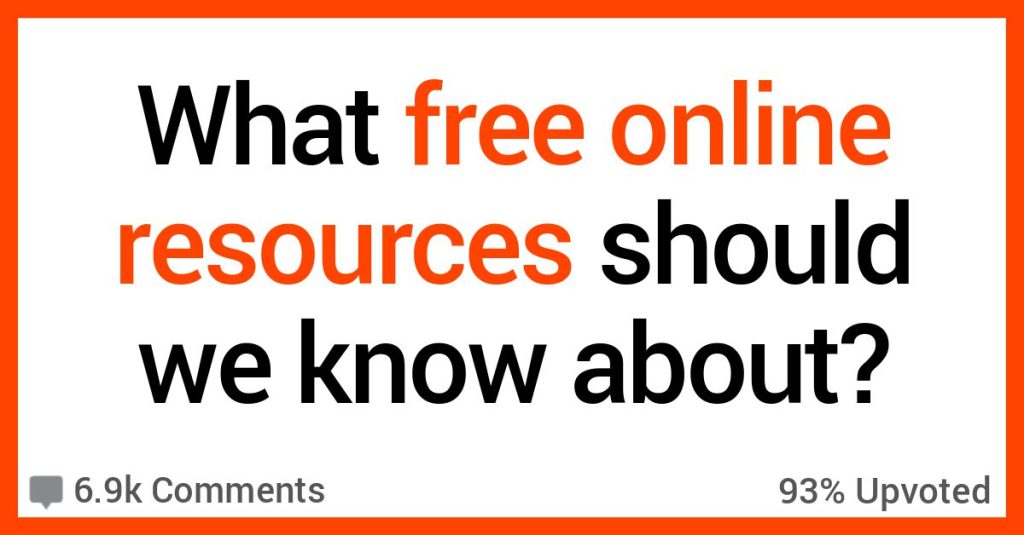Free stuff = Good stuff, right?!?! You’re darn right, friends!
And we’re about to get a heaping helping of free stuff right now!
AskReddit users talked about free online resources that we should all know about.
Let’s take a look.
1. Awesome.
“Internet Archive’s Open Library:
You can check out books from a ton of different public libraries. For free. It’s insane.”
2. You gotta have it!
For your cartoon and anime needs.
I have been using this website for years and am watching Star Wars the Clone Wars on it right now.”
3. Get smart!
“Khan Academy is the greatest thing!
Not only is it free education, I’ve had a lot of online courses opt for Khan videos/articles rather than having us buy an expensive textbook.”
4. Artsy.
“Art Breeder.
You’re able to mix images together to create something new and keep tweaking it until you get something you like.
Personally, I like using it to create characters that look similar to the ones in my head–useful for story writing.”
5. That’s cool.
“You can help plant trees for free by changing your default search engine from Google to www.ecosia.org
I’ve been using it for years, planted hundreds of trees and search quality is nearly identical to Google.”
6. Just like the books!
It gives a detailed description of almost any book by chapter, saved my life last year.”
7. Scholarly.
“Google Scholar.
You can search for academic journals, articles and papers.
This helped me ALOT with college and it even gives you the citations for whatever you are using.”
8. A twofer.
“Two things:
DeepL.com – a translating service that blows my linguistic mind to this day
Photopea.com – Photoshop, but free.”
9. Amazing.
“MIT OpenCourseWare.
I’ve learned half of MIT’s undergraduate physics curriculum during my sophomore year of high school.
There won’t be a need to go to college to get a bachelors degree amount of education soon.”
10. Get busy in the kitchen.
“Cooking lessons on YouTube.
People think I’m an amazing cook when they come over for dinner.
I just hit the pause button a million times on new recipes.”
11. Good to know.
“Sci-hub: access to free scientific articles
Telegram: I use it as free, unlimited and private cloud storage and also to see any recently released movie or download books, etc.”
12. I’m all in!
It’s an awesome language website where you can learn Spanish, French, German, or English for free. I’ve heard the German program is as good as or better than Rosetta Stone.
Better yet, the point of the website is not only to teach people a new language, but help people who already know a little get better and translate web pages.”
13. Discover your history.
“I found out I have confederate ancestors through findagrave.com, and have built a family tree going back to the 1700s.
Pro tip – African Americans get discouraged when building family trees because of the imagined lack of records, but please use:
censusrecords.com, findagrave.com, and the national parks civil war veterans registry. (Black confederate veteran’s pension records will be kept at the state archives, and are not attached to the national registration, which gives branch, regiment, company, and state. confederatevets.org, might have clearer information. Black confederates will have less clear records than black Union veterans.)
You’re working your way backwards with names, states/counties, dates, and other criteria. Please know that the 1850 and 1860 census contain slave schedules, wherein many people find their last name is linked to that of a slave owner, or through an illegal interracial marriage. At that point, much of what remains is diary scraps, ship records, and newspaper scraps (such as those found for free on the Chronicling America Project by the Library of Congress).
Chronicling America allows sorting by keywords, state, and year range, but be aware a lot of state archives contain out of state papers, and desired papers might need unorthodox searches. As a rule the term ‘negro’, ‘sale’, and the surname of a buyer, owner, auctioneer/seller will offer a trail to a port, or at least a county within a state.
Take screenshots, and write things down on physical paper for the best clarity.
While local heritage museums might have plantation or ship records (you’ll have to email/phone multiple in a multiple-county area to know), don’t count on these records surviving the city torching done through the war years. Don’t feel discouraged, because everyone hits a wall eventually.
The European wall is about 1550 or later, when last names became common. It’s very common for misspellings, and pre-national language regional languages to muddle names (eg. German v Dutch, Irish v Scottish, Vietnamese v Laotian). The black wall is 1850 much of the time.
If your goal is to find African nation ancestry, it’s ultra rare to find it. However, language studies have found that the vast bulk of African diaspora in the New World are from the far western African coastal nations. The dashiki, much of voudoo, Creoles, Ananzi the spider, the roots of soul food, and other legacy practices come from this small-ish region.
So Liberia, to the Ivory Coast, Ghana, to Seira Leone, and the northern half of the Congo coast is the ancestral origin point, if that’s your goal. Bantu and French are the chief languages to look at (not Swahili). If you try to find a specific tribal group or nation, you’re not seeing the forest for all the trees.
You are entitled to history. It’s yours, take it.”
What are some more free things people should know about?
Talk to us in the comments and let us know!
Thanks in advance!






